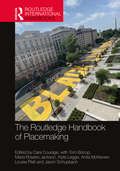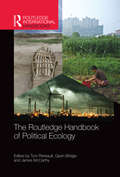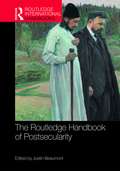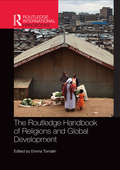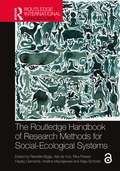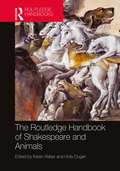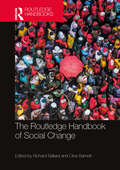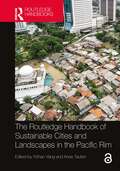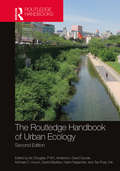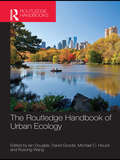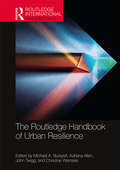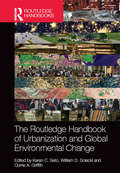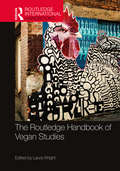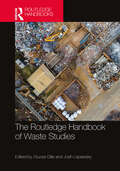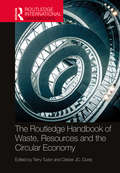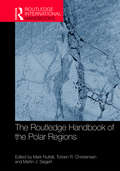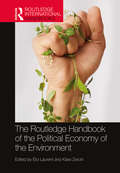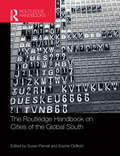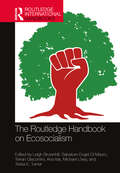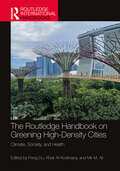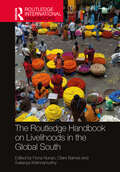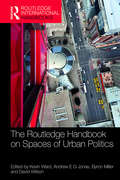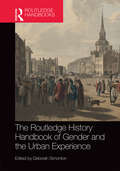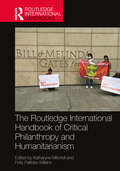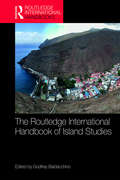- Table View
- List View
The Routledge Handbook of Placemaking (Routledge International Handbooks)
by Cara CourageThis Handbook is the first to explore the emergent field of ‘placemaking’ in terms of the recent research, teaching and learning, and practice agenda for the next few years. Offering valuable theoretical and practical insights from the leading scholars and practitioners in the field, it provides cutting-edge interdisciplinary research on the placemaking sector. Placemaking has seen a paradigmatic shift in urban design, planning, and policy to engage the community voice. This Handbook examines the development of placemaking, its emerging theories, and its future directions. The book is structured in seven distinct sections curated by experts in the areas concerned. Section One provides a glimpse at the history and key theories of placemaking and its interpretations by different community sectors. Section Two studies the transformative potential of placemaking practice through case studies on different places, methodologies, and theoretical frameworks. It also reveals placemaking’s potential to nurture a holistic community engagement, social justice, and human-centric urban environments. Section Three looks at the politics of placemaking to consider who is included and who is excluded from its practice and if the concept of placemaking needs to be reconstructed. Section Four deals with the scales and scopes of art-based placemaking, moving from the city to the neighborhood and further to the individual practice. It juxtaposes the voice of the practitioner and professional alongside that of the researcher and academic. Section Five tackles the socio-economic and environmental placemaking issues deemed pertinent to emerge more sustainable placemaking practices. Section Six emphasizes placemaking’s intersection with urban design and planning sectors and incudes case studies of generative planning practice. The final seventh section draws on the expertise of placemakers, researchers, and evaluators to present the key questions today, new methods and approaches to evaluation of placemaking in related fields, and notions for the future of evaluation practices. Each section opens with an introduction to help the reader navigate the text. This organization of the book considers the sectors that operate alongside the core placemaking practice. This seminal Handbook offers a timely contribution and international perspectives for the growing field of placemaking. It will be of interest to academics and students of placemaking, urban design, urban planning and policy, architecture, geography, cultural studies, and the arts.
The Routledge Handbook of Political Ecology (Routledge International Handbooks)
by Gavin Bridge Tom Perreault James McCarthyThe Routledge Handbook of Political Ecology presents a comprehensive and authoritative examination of the rapidly growing field of political ecology. Located at the intersection of geography, anthropology, sociology, and environmental history, political ecology is one of the most vibrant and conceptually diverse fields of inquiry into nature-society relations within the social sciences. The Handbook serves as an essential guide to this rapidly evolving intellectual landscape. With contributions from over 50 leading authors, the Handbook presents a systematic overview of political ecology’s origins, practices and core concerns, and aims to advance both ongoing and emerging debates. While there are numerous edited volumes, textbooks, and monographs under the heading ‘political ecology,’ these have tended to be relatively narrow in scope, either as collections of empirically based (mostly case study) research on a given theme, or broad overviews of the field aimed at undergraduate audiences. The Routledge Handbook of Political Ecology is the first systematic, comprehensive overview of the field. With authors from North and South America, Europe, Australia and elsewhere, the Handbook of Political Ecology provides a state of the art examination of political ecology; addresses ongoing and emerging debates in this rapidly evolving field; and charts new agendas for research, policy, and activism. The Routledge Handbook of Political Ecology introduces political ecology as an interdisciplinary academic field. By presenting a ‘state of the art’ examination of the field, it will serve as an invaluable resource for students and scholars. It not only critically reviews the key debates in the field, but develops them. The Handbook will serve as an excellent resource for graduate and advanced undergraduate teaching, and is a key reference text for geographers, anthropologists, sociologists, environmental historians, and others working in and around political ecology.
The Routledge Handbook of Postsecularity (Routledge International Handbooks)
by Justin BeaumontThe Routledge Handbook of Postsecularity offers an internationally significant and comprehensive interdisciplinary collection which provides a series of critical reviews of the current state of the art and future trends in philosophical, theoretical, and conceptual terms. The volume likewise presents a range of empirical knowledges and engagements with postsecularity. A critical yet sympathetic dialogue across disciplinary divides in an international context ensures that the volume covers a wide and interrelated intellectual and geographical scope. The editor’s introduction with Klaus Eder offers a robust foundation for the volume, setting out the central aims and objectives, the rationale for the contributions, and an outline of the structure. Thorny issues of normativity and empirical challenges are highlighted for the reader. The handbook comprises four interrelated sections. Part I: Philosophical meditations discusses postsecularity from philosophical standpoints, and Part II: Theological perspectives presents contributions from a variety of theological viewpoints. Part III: Theory, space, social relations contains pieces from geography, planning, sociology, and religious studies that delve into theoretically informed empirical implications of postsecularity. Part IV: Political and social engagement offers chapters that emphasize the political and social implications of the debate. In the Afterword, Eduardo Mendieta joins the editor to reflect on the notion of reflexive secularization across the volume as a whole, alluding to new lines of inquiry. The handbook is an invaluable guide for graduate and advanced undergraduate teaching, and a key reference for students and scholars of human geography, sociology, political science, applied philosophy, urban and public theology, planning, and urban studies.
The Routledge Handbook of Religions and Global Development (Routledge International Handbooks)
by Emma TomalinThis Handbook provides a cutting-edge survey of the state of research on religions and global development. Part one highlights critical debates that have emerged within research on religions and development, particularly with respect to theoretical, conceptual and methodological considerations, from the perspective of development studies and its associated disciplines. Parts two to six look at different regional and national development contexts and the place of religion within these. These parts integrate and examine the critical debates raised in part one within empirical case studies from a range of religions and regions. Different religions are situated within actual locations and case studies thus allowing a detailed and contextual understanding of their relationships to development to emerge. Part seven examines the links between some important areas within development policy and practice where religion is now being considered, including: Faith-Based Organisations and Development Public Health, Religion and Development Human rights, Religion and Development Sustainable Development, Climate Change and Religion Global Institutions and Religious Engagement in Development Economic Development and Religion Religion, Development and Fragile States Development and Faith-Based Education Taking a global approach, the Handbook covers Africa, Latin America, South Asia, East and South-East Asia, and the Middle East. It is essential reading for students and researchers in development studies and religious studies, and is highly relevant to those working in area studies, as well as a range of disciplines, from theology, anthropology and economics to geography, international relations, politics and sociology.
The Routledge Handbook of Research Methods for Social-Ecological Systems (Routledge International Handbooks)
by Rika Preiser Reinette Biggs Maja Schlüter Alta De Vos Hayley Clements Kristine MaciejewskiThe Routledge Handbook of Research Methods for Social-Ecological Systems provides a synthetic guide to the range of methods that can be employed in social-ecological systems (SES) research. The book is primarily targeted at graduate students, lecturers and researchers working on SES, and has been written in a style that is accessible to readers entering the field from a variety of different disciplinary backgrounds. Each chapter discusses the types of SES questions to which the particular methods are suited and the potential resources and skills required for their implementation, and provides practical examples of the application of the methods. In addition, the book contains a conceptual and practical introduction to SES research, a discussion of key gaps and frontiers in SES research methods, and a glossary of key terms in SES research. Contributions from 97 different authors, situated at SES research hubs in 16 countries around the world, including South Africa, Sweden, Germany and Australia, bring a wealth of expertise and experience to this book. The first book to provide a guide and introduction specifically focused on methods for studying SES, this book will be of great interest to students and scholars of sustainability science, environmental management, global environmental change studies and environmental governance. The book will also be of interest to upper-level undergraduates and professionals working at the science–policy interface in the environmental arena.
The Routledge Handbook of Shakespeare and Animals (Routledge Literature Handbooks)
by Karen Raber and Holly DuganShakespeare’s plays have a long and varied performance history. The relevance of his plays in literary studies cannot be understated, but only recently have scholars been looking into the presence and significance of animals within the canon. Readers will quickly find—without having to do extensive research—that the plays are teeming with animals! In this Handbook, Karen Raber and Holly Dugan delve deep into Shakespeare’s World to illuminate and understand the use of animals in his span of work. This volume supplies a valuable resource, offering a broad and thorough grounding in the many ways animal references and the appearance of actual animals in the plays can be interpreted. It provides a thorough overview; demonstrates rigorous, original research; and charts new frontiers in the field through a broad variety of contributions from an international group of well-known and respected scholars.
The Routledge Handbook of Social Change
by Clive Barnett Richard BallardThe Routledge Handbook of Social Change provides an interdisciplinary primer to the intellectual approaches that hold the key to understanding the complexity of social change in the twenty-first century. We live in a world of intense social transformation, economic uncertainty, cultural innovations, and political turmoil. Established understandings of issues of well-being, development, democratisation, progress, and sustainability are being rethought both in academic scholarship and through everyday practice, organisation and mobilisation. The contributors to this handbook provide state-of-the-art introductions to current thinking on central conceptual and methodological approaches to the analysis of the transformations shaping economies, polities, and societies. Topics covered include social movements, NGOs, the changing nature of the state, environmental politics, human rights, anti-globalism, pandemic emergencies, post-Brexit politics, the politics of resilience, new technologies, and the proliferation of progressive and reactionary forms of identity politics. Drawing on disciplines including anthropology, human geography, political sociology, and development studies, this is a comprehensive and authoritative introduction to researching key issues raised by the challenge of making sense of the twenty-first century futures.
The Routledge Handbook of Sustainable Cities and Landscapes in the Pacific Rim (Routledge Environment and Sustainability Handbooks)
by Yizhao YangThis handbook addresses a growing list of challenges faced by regions and cities in the Pacific Rim, drawing connections around the what, why, and how questions that are fundamental to sustainable development policies and planning practices. These include the connection between cities and surrounding landscapes, across different boundaries and scales; the persistence of environmental and development inequities; and the growing impacts of global climate change, including how physical conditions and social implications are being anticipated and addressed. Building upon localized knowledge and contextualized experiences, this edited collection brings attention to place-based approaches across the Pacific Rim and makes an important contribution to the scholarly and practical understanding of sustainable urban development models that have mostly emerged out of the Western experiences. Nine sections, each grounded in research, dialogue, and collaboration with practical examples and analysis, focus on a theme or dimension that carries critical impacts on a holistic vision of city-landscape development, such as resilient communities, ecosystem services and biodiversity, energy, water, health, and planning and engagement. This international edited collection will appeal to academics and students engaged in research involving landscape architecture, architecture, planning, public policy, law, urban studies, geography, environmental science, and area studies. It also informs policy makers, professionals, and advocates of actionable knowledge and adoptable ideas by connecting those issues with the Sustainable Development Goals (SDGs) of the United Nations. The collection of writings presented in this book speaks to multiyear collaboration of scholars through the APRU Sustainable Cities and Landscapes (SCL) Program and its global network, facilitated by SCL Annual Conferences and involving more than 100 contributors from more than 30 institutions.
The Routledge Handbook of Urban Ecology
by Douglas, Ian / Anderson, P M L / Goode, David / Houck, Michael C. / Maddox, David / Nagendra, Harini / Yok, Tan PuayThis second edition covers recent developments around the world with contributors from 33 different countries. It widens the handbook’s scope by including ecological design; consideration of cultural dimensions of the use and conservation of urban nature; the roles of government and civil society; and the continuing issues of equity and fairness in access to urban greenspaces. New features include an emphasis on the biophilic design of homes and workplaces, demonstrating the value of nature, in order to counter the still prevalent attitude among many developers that nature is a constraint rather than a value. The volume explores great practical achievements that have occurred since the first edition, with many governments increasingly recognizing and legislating on urban nature and green infrastructure matters, since cities play a major role in adapting to change, particularly to climate crisis. New topics such as the ecological role of light at night and human microbiota in the urban ecosystem are introduced. Additional attention is given to food production in cities, particularly the multiple roles of urban agriculture and household gardens in different contexts from wealthy communities to the poorest informal settlements in deprived communities. The emphasis is on demonstrating what can be achieved, and what is already being done. The book aims to help scholars and graduate students by providing an invaluable and up-to-date guide to current urban ecological thinking across the range of disciplines, such as geography, ecology, environmental science/studies, planning, and urban studies, that converge in the study of towns and cities and urban design and living. It will also assist practitioners and civil society members in discovering the ways diff erent specialists and thinkers approach urban nature.
The Routledge Handbook of Urban Ecology
by Ian DouglasThe birds, animals, insects, trees and plants encountered by the majority of the world’s people are those that survive in, adapt to, or are introduced to, urban areas. Some of these organisms give great pleasure; others invade, colonise and occupy neglected and hidden areas such as derelict land and sewers. Urban areas have a high biodiversity and nature within cities provides many ecosystem services including cooling the urban area, reducing urban flood risk, filtering pollutants, supplying food, and providing accessible recreation. Yet, protecting urban nature faces competition from other urban land uses. The Handbook of Urban Ecology analyses this biodiversity and complexity and provides the science to guide policy and management to make cities more attractive, more enjoyable, and better for our own health and that of the planet. This Handbook contains 50 interdisciplinary contributions from leading academics and practitioners from across the world to provide an in-depth coverage of the main elements of practical urban ecology. It is divided into six parts, dealing with the philosophies, concepts and history of urban ecology; followed by consideration of the biophysical character of the urban environment and the diverse habitats found within it. It then examines human relationships with urban nature, the health, economic and environmental benefits of urban ecology before discussing the methods used in urban ecology and ways of putting the science into practice. The Handbook offers a state-of the art guide to the science, practice and value of urban ecology. The engaging contributions provide students and practitioners with the wealth of interdisciplinary information needed to manage the biota and green landscapes in urban areas.
The Routledge Handbook of Urban Resilience (Routledge International Handbooks)
by Adriana Allen Christine Wamsler Michael A. Burayidi John TwiggThis volume provides a comprehensive discussion and overview of urban resilience, including socio-ecological and economic hazard and disaster resilience. It provides a summary of state of the art thinking on resilience, the different approaches, tools and methodologies for understanding the subject in urban contexts, and brings together related reflections and initiatives. Throughout the different chapters, the handbook critically examines and reviews the resilience concept from various disciplinary and professional perspectives. It also discusses major urban crises, past and recent, and the generic lessons they provide for resilience. In this context, the authors provide case studies from different places and times, including historical material and contemporary examples, and studies that offer concrete guidance on how to approach urban resilience. Other chapters focus on how current understanding of urban systems – such as shrinking cities, green infrastructure, disaster volunteerism, and urban energy systems – are affecting the capacity of urban citizens, settlements and nation-states to respond to different forms and levels of stressors and shocks. The handbook concludes with a synthesis of the state of the art knowledge on resilience and points the way forward in refining the conceptualization and application of urban resilience. The book is intended for scholars and graduate students in urban studies, environmental and sustainability studies, geography, planning, architecture, urban design, political science and sociology, for whom it will provide an invaluable and up-to-date guide to current approaches across these disciplines that converge in the study of urban resilience. The book also provides important direction to practitioners and civic leaders who are engaged in supporting cities and regions to position themselves for resilience in the face of climate change, unpredictable socioenvironmental shocks and incremental risk accumulation.
The Routledge Handbook of Urbanization and Global Environmental Change (Routledge International Handbooks)
by William D. Solecki Karen C. Seto Corrie A. GriffithThis volume provides a comprehensive overview of the interactions and feedbacks between urbanization and global environmental change. A key focus is the examination of how urbanization influences global environmental change, and how global environmental change in turn influences urbanization processes. It has four thematic foci: Theme 1 addresses the pathways through which urbanization drives global environmental change. Theme 2 addresses the pathways through which global environmental change affects the urban system. Theme 3 addresses the interactions and responses within the urban system in response to global environmental change. Theme 4 centers on critical emerging research.
The Routledge Handbook of Vegan Studies (Routledge International Handbooks)
by Laura WrightThis wide-ranging volume explores the tension between the dietary practice of veganism and the manifestation, construction, and representation of a vegan identity in today’s society. Emerging in the early 21st century, vegan studies is distinct from more familiar conceptions of "animal studies," an umbrella term for a three-pronged field that gained prominence in the late 1990s and early 2000s, consisting of critical animal studies, human animal studies, and posthumanism. While veganism is a consideration of these modes of inquiry, it is a decidedly different entity, an ethical delineator that for many scholars marks a complicated boundary between theoretical pursuit and lived experience. The Routledge Handbook of Vegan Studies is the must-have reference for the important topics, problems, and key debates in the subject area and is the first of its kind. Comprising over 30 chapters by a team of international contributors, this handbook is divided into five parts: History of vegan studies Vegan studies in the disciplines Theoretical intersections Contemporary media entanglements Veganism around the world These sections contextualize veganism beyond its status as a dietary choice, situating veganism within broader social, ethical, legal, theoretical, and artistic discourses. This book will be essential reading for students and researchers of vegan studies, animal studies, and environmental ethics.
The Routledge Handbook of Waste Studies (Routledge Environment and Sustainability Handbooks)
by Zsuzsa GilleThe Routledge Handbook of Waste Studies offers a comprehensive survey of the new field of waste studies, critically interrogating the cultural, social, economic and political systems within which waste is created, managed and circulated. While scholars have not settled on a definitive categorization of what waste studies is, more and more researchers claim that there is distinct cluster of inquiries, concepts, theories and key themes that constitute this field. In this handbook the editors and contributors explore the research questions, methods and case studies preoccupying academics working in this field, in an attempt to develop a set of criteria by which to define and understand waste studies as an interdisciplinary field of study. This handbook will be invaluable to those wishing to broaden their understanding of waste studies and to students and practitioners of geography, sociology, anthropology, history, environment and sustainability studies.
The Routledge Handbook of Waste, Resources and the Circular Economy (Routledge International Handbooks)
by Terry Tudor Cleber Jc. DutraThe Handbook introduces, contextualises, critiques, and discusses a range of perspectives associated with the concept of the circular economy. These perspectives span an array of subjects including economics, environmental policymaking, sociology, environmental science, environmental and industrial engineering, management, international development, and human geography. A fundamental underpinning of the Handbook is that it takes account of a wide range of sectors, as well as geographical perspectives that incorporate both a Global North and Global South world context. This approach is crucial because it is only within such a holistic perspective that the circular economy concept can truly be examined. In addition, these issues are examined both from a theoretical as well as a practical perspective, using real-world case studies for illustration. Given its wide subject, sectoral, and geographical areas of focus, the Handbook should be of value not only for those undertaking research in the field of circular economy, but also stakeholders involved in policymaking, as well as decision-making on the front line.
The Routledge Handbook of the Polar Regions (Routledge International Handbooks)
by Mark Nuttall Torben R Christensen Martin SiegertThe Routledge Handbook of the Polar Regions is an authoritative guide to the Arctic and the Antarctic through an exploration of key areas of research in the physical and natural sciences and the social sciences and humanities. It presents 38 new and original contributions from leading figures and voices in polar research, policy and practice, as well as work from emerging scholars. This handbook aims to approach and understand the Polar Regions as places that are at the forefront of global conversations about some of the most pressing contemporary issues and research questions of our age. The volume provides a discussion of the similarities and differences between the two regions to help deepen understanding and knowledge. Major themes and issues are integrated in the comprehensive introduction chapter by the editors, who are top researchers in their respective fields. The contributions show how polar researchers engage with contemporary debates and use interdisciplinary and multidisciplinary approaches to address new developments as well as map out exciting trajectories for future work in the Arctic and the Antarctic. The handbook provides an easy access to key items of scholarly literature and material otherwise inaccessible or scattered throughout a variety of specialist journals and books. A unique one-stop research resource for researchers and policymakers with an interest in the Arctic and Antarctic, it is also a comprehensive reference work for graduate and advanced undergraduate students.
The Routledge Handbook of the Political Economy of the Environment (Routledge International Handbooks)
by Éloi Laurent Klara ZwicklFeaturing a stellar international cast list of leading and cutting-edge scholars, The Routledge Handbook of the Political Economy of the Environment presents the state of the art of the discipline that considers ecological issues and crises from a political economy perspective. This collective volume sheds new light on the effect of economic and power inequality on environmental dynamics and, conversely, on the economic and social impact of environmental dynamics. The chapters gathered in this handbook make four original contributions to the field of political economy of the environment. First, they revisit essential concepts and methods of environmental economics in the light of their political economy. Second, they introduce readers to recent theoretical and empirical advances in key issues of political economy of the environment with a special focus on the relationship between inequality and environmental degradation, a nexus that has dramatically come into focus with the COVID crisis. Third, the authors of this handbook open the field to its critical global and regional dimensions: global issues, such as the environmental justice movement and inequality and climate change as well as regional issues such as agriculture systems, air pollution, natural resources appropriation and urban sustainability. Fourth and finally, the work shows how novel analysis can translate into new forms of public policy that require institutional reform and new policy tools. Ecosystems preservation, international climate negotiations and climate mitigation policies all have a strong distributional dimension that chapters point to. Pressing environmental policy such as carbon pricing and low-carbon and energy transitions entail numerous social issues that also need to be accounted for with new analytical and technological tools. This handbook will be an invaluable reference, research and teaching tool for anyone interested in political economy approaches to environmental issues and ecological crises.
The Routledge Handbook on Cities of the Global South
by Susan Parnell Sophie OldfieldThe renaissance in urban theory draws directly from a fresh focus on the neglected realities of cities beyond the west and embraces the global south as the epicentre of urbanism. This Handbook engages the complex ways in which cities of the global south and the global north are rapidly shifting, the imperative for multiple genealogies of knowledge production, as well as a diversity of empirical entry points to understand contemporary urban dynamics. The Handbook works towards a geographical realignment in urban studies, bringing into conversation a wide array of cities across the global south – the ‘ordinary’, ‘mega’, ‘global’ and ‘peripheral’. With interdisciplinary contributions from a range of leading international experts, it profiles an emergent and geographically diverse body of work. The contributions draw on conflicting and divergent debates to open up discussion on the meaning of the city in, or of, the global south; arguments that are fluid and increasingly contested geographically and conceptually. It reflects on critical urbanism, the macro- and micro-scale forces that shape cities, including ideological, demographic and technological shifts, and constantly changing global and regional economic dynamics. Working with southern reference points, the chapters present themes in urban politics, identity and environment in ways that (re)frame our thinking about cities. The Handbook engages the twenty-first-century city through a ‘southern urban’ lens to stimulate scholarly, professional and activist engagements with the city.
The Routledge Handbook on Ecosocialism (Routledge International Handbooks)
by Michael Löwy Ana Isla Salvatore Engel-Di Mauro Leigh Brownhill Terran Giacomini Terisa E. TurnerBuilding on the classical works that have propelled and shaped ecosocialist thinking and action and more recent political developments on the ground, the volume will provide a reference point for international work in the field, both directly political and academic. The Handbook acquaints readers with the varied roots of and sometimes conflicting approaches to ecosocialism. It does not attempt any unification of ecosocialist currents. Rather, it aims to provide a resource that is as comprehensive as possible with respect not only to theorization and ideological framing, but also and especially to existing projects, practices, and movements and giving a sense of the geographical reach that ecosocialism so far represents. This includes scholarship that extends Marxist foundations and reflects on more recent political developments. The theoretical and practice-oriented moorings are buttressed by discussions on movements, frameworks, and prefigurative processes as well as on social struggles occurring within institutional settings. Together, the collection offers a reference point for international work in the field, in social movements, and in institutional transformations. Providing detailed but accessible overviews of the complex, varied dimensions of ecosocialism, the Handbook is an essential up-to-date guide and reference not only for researchers, but also for undergraduate and graduate students in geography, environmental studies, development studies, sociology, and political science, as well as for policymakers and activists.
The Routledge Handbook on Greening High-Density Cities: Climate, Society and Health (Routledge International Handbooks)
by Kheir Al-Kodmany Peng Du Mir M. AliThis new handbook provides a platform to bring together multidisciplinary researchers focusing on greening high-density agglomerations from three perspectives: climate change, social implications, and people’s health. Written by leading scholars and experts, the chapters aim to summarize the “state-of-the-art” and produce a reference book for policymakers, practitioners, academics, and researchers to study, design, and build high-density cities by integrating green spaces. The topics covered in the book include (but are not limited to) Urban Heat Island, Green Space and Carbon Sequestration, Green Space and Social Equity, Green Space and Public Health, Biophilic Cities, Urban Agriculture, Vertical Farms, Urban Farming Technologies, Nature and Biodiversity, Nature and Health, Biophilic Design, Green Infrastructure, Urban Revitalization, Post-Covid Cities, Smart and Resilient Cities, Tall Buildings, and Sustainable Vertical Cities.
The Routledge Handbook on Livelihoods in the Global South (Routledge International Handbooks)
by Fiona Nunan Sukanya Krishnamurthy Clare BarnesThe Routledge Handbook on Livelihoods in the Global South presents a unique, timely, comprehensive overview of livelihoods in low- and middle-income countries. Since their widespread adoption in the 1990s, livelihoods perspectives, frameworks and methods have influenced diverse areas of research, policy and practice. The concept of livelihoods reflects the complexity of strategies and practices used by individuals, households and communities to meet their needs and live their lives. The Handbook brings together insights and critical analysis from diverse approaches and experiences, learning from research and practice over the last 30 years. The Handbook comprises an introductory section on key concepts and frameworks, followed by five parts, on researching livelihoods, negotiating livelihoods, generating livelihoods, enabling livelihoods and contextualising livelihoods. The introduction provides readers with an appreciation of concepts researched and applied in the five parts, including chapters on vulnerability and resilience, social capital and networks, and institutions. Each part reflects the diversity of approaches taken to understanding livelihoods, whilst recognising commonalities, including the centrality of power in shaping, enabling and constraining livelihoods. The book also reflects diversity of context, including conflict, climate change and religion, as well as in generating livelihoods, through agriculture, small-scale mining and pastoralism. The aim of each chapter is to provide a critically informed introduction and overview of key concepts, issues and debates of relevance to the topic, with each chapter concluding with suggestions for further reading. It will be an essential resource to students, researchers and practitioners of international development and related fields. Researchers and practitioners will also benefit from the book's diverse disciplinary contributions and by the wide and contemporary coverage.
The Routledge Handbook on Spaces of Urban Politics (Routledge International Handbooks)
by Kevin Ward David Wilson Andrew E. Jonas Byron MillerThe Routledge Handbook on Spaces of Urban Politics provides a comprehensive statement and reference point for urban politics. The scope of this handbook’s coverage and contributions engages with and reflects upon the most important, innovative and recent critical developments to the interdisciplinary field of urban politics, drawing upon a range of examples from within and across the Global North and Global South. This handbook is organized into nine interrelated sections, with an introductory chapter setting out the rationale, aims and structure of the Handbook, and short introductory commentaries at the beginning of each part. It questions the eliding of ‘urban politics’ into the ‘politics of the city’, reconsidering the usefulness of the distinction between ‘old’ and ‘new’ urban politics, considering issues of ‘class’, ‘gender’, ‘race’ and the ways in which they intersect, appear and reappear in matters of urban politics, how best to theorize the roles of capital, the state and other actors, such as social movements, in the production of the city and, finally, issues of doing urban political research. The various chapters explore the issues of urban politics of economic development, environment and nature in the city, governance and planning, the politics of labour as well as living spaces. The concluding sections of the Handbook examine the politics over alternative visions of cities of the future and provide concluding discussions and reflections, particularly on the futures for urban politics in an increasingly ‘global’ and multidisciplinary context. With over forty-five contributions from leading international scholars in the field, this handbook provides critical reviews and appraisals of current conceptual and theoretical approaches and future developments in urban politics. It is a key reference to all researchers and policy-makers with an interest in urban politics.
The Routledge History Handbook of Gender and the Urban Experience (Routledge History Handbooks)
by Deborah SimontonChallenging current perspectives of urbanisation, The Routledge History Handbook of Gender and the Urban Experience explores how our towns and cities have shaped and been shaped by cultural, spatial and gendered influences. This volume discusses gender in an urban context in European, North American and colonial towns from the fourteenth to the twentieth century, casting new light on the development of medieval and modern settlements across the globe.Organised into six thematic parts covering economy, space, civic identity, material culture, emotions and the colonial world, this book comprises 36 chapters by key scholars in the field. It covers a wide range of topics, from women and citizenship in medieval York to gender and tradition in nineteenth- and twentieth-century South African cities, reframing our understanding of the role of gender in constructing the spaces and places that form our urban environment.Interdisciplinary and transnational in scope, this volume analyses the individual dynamics of each case study while also examining the complex relationships and exchanges between urban cultures. It is a valuable resource for all researchers and students interested in gender, urban history and their intersection and interaction throughout the past five centuries.
The Routledge International Handbook of Critical Philanthropy and Humanitarianism (Routledge International Handbooks)
by Katharyne Mitchell Polly Pallister-WilkinsThis handbook builds a shared understanding of the troubling politics of philanthropy and the disturbing history and practices of humanitarianism. While historical work on philanthropy has long suggested a link between imperial rule and humanitarian aid, these insights have only recently been brought to bear on contemporary forms of giving. In this book, contributors link the long history of colonial philanthropy to current foundations and their programs in education, health, migrant care, and other social initiatives. They argue that both philanthropy and humanitarianism often function to consolidate market rule, consolidating and expanding liberal market rationalities of neoliberal entrepreneurialism to a widening population and set of institutions. Philanthropy and humanitarianism share a history, growing together out of modernist socio-economic relations and modes of imperial rule. However, the histories and contemporary politics of the two have not been brought together with such breadth or under such a critical lens before. Discussing philanthropy and humanitarianism together, combining both historical scope and contemporary iterations, highlights continuities and convergences—making the volume a unique introduction and critical overview of critical work in these sister-fields.
The Routledge International Handbook of Island Studies: A World of Islands
by Godfrey BaldacchinoFrom tourist paradises to immigrant detention camps, from offshore finance centres to strategic military bases, islands offer distinct identities and spaces in an increasingly homogenous and placeless world. The study of islands is important, for its own sake and on its own terms. But so is the notion that the island is a laboratory, a place for developing and testing ideas, and from which lessons can be learned and applied elsewhere. The Routledge International Handbook of Island Studies is a global, research-based and pluri-disciplinary overview of the study of islands. Its chapters deal with the contribution of islands to literature, social science and natural science, as well as other applied areas of inquiry. The collated expertise of interdisciplinary and international scholars offers unique insights: individual chapters dwell on geomorphology, zoology and evolutionary biology; the history, sociology, economics and politics of island communities; tourism, wellbeing and migration; as well as island branding, resilience and ‘commoning’. The text also offers pioneering forays into the study of islands that are cities, along rivers or artificial constructions. This insightful Handbook will appeal to geographers, environmentalists, sociologists, political scientists and, one hopes, some of the 600 million or so people who live on islands or are interested in the rich dynamics of islands and island life.
